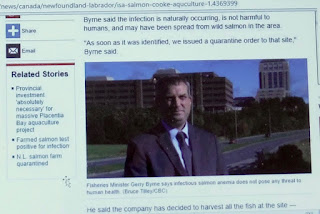Here is my take on her very good work: http://fishfarmnews.blogspot.com/2016/09/canadian-food-inspection-agency.html. I have asked the Attorney General to look into this, but have not heard back... Hmm, will have to prod the AG again.
Here is another long piece of outstanding work, this time by Bill Bryden in NL, regarding the various dodges that the CFIA, fish farm companies, Minister of Fisheries and so on, perpetrate not to find ISA, yet to put the fish into Canadians kitchens, disease running down the drains - because it can't be sold to the USA, as it is ISA fish. Click on the images to enlarge them and read on.
Here is Bill:
NL 2017/2018
ISA Epidemic Timeline and Backgrounder
Provided by the NL
Coalition for Aquaculture Reform
Most NL open net pen sites have 750,000 to 800,000 fish
stocked at the time of an outbreak. These cages are far too close together and
stocked at higher densities than recommended by many industry scientists and
insiders.
In fact, Chile just made efforts and regs to reduce
densities and the proximity of the cages to each other due to ISAv fears. http://salmonbusiness.com/chilean-government-to-evaluate-new-sanitary-measures-after-aysen-isa-virus-discovery/.
By comparison, the south coast regions (as classified by DFO
as DU4) has an estimated 26,000 wild salmon left that COSWEIC has listed
as “Threatened” spanning 58 rivers. Over 100 rivers containing sea run trout are
in the same area. To date, an estimated 4.5 million fish (and counting)
have been condemned or otherwise harvested while amplifying ISAv since Fall
2017.
Quarantine type controls used for land based RAS tanks do
not work for marine open net pens which intrinsically can not be quarantined to
prevent spread of disease to wild fish and marine life. Moreover, any microbial
secondary infections require non-targeted broadcast use of copious amounts of
antibiotics due to the sick fish not eating the medicated feed pellets thrown
into the ocean.
The Spyglass Cove site has not been listed on the CFIA
website as having ISAv HPR despite that it occurred in March and was cull over
the following weeks. In fact, I anticipate that neither will the Tilt Point
site be listed as ISAv positive by CFIA.
And selling ISAv to the public. Despite that is remains
HIGHLY contagious to wild fish at the end of a sink drain.
Only “finding it” in one cage and not all cages and thus requiring only one cage to be condemned.
And another policy that allows vets to not find the virus a
second time and by doing so completely ignore the first positive test! This is
now the new normal and how sites will never be listed on the CFIA and other
public relations sites. Tested by the vet, found positive, culled, and never
reported to CFIA.
This of course is not what the industry tells the public:
The List to Date:
Note that the St. Alban's plant could only process 2.6M fish
if it ran at near maximum capacity for 52 weeks and didn't even stop for Xmas.
At least 4.5 M fish have been condemned for ISAv so far during this outbreak in
NL alone. Untold wild fish would have been infected, but no monitoring of these
numbers is done.
2017 October 31 CFIA listing - Cooke non-pathogenic.
HPR 0 (HPR 0 found in January 2017 as well)
2017 November 28 CFIA listing but happened in October
- Cooke (diagnosed but now at market size!, note that ISAv HPR 0 was found as
far back as January in 2017 but no fish were culled all winter spring and
summer, Five of 35 fish tested in one of six open-pen cages had the infection )
2018 February 13 Cooke (market size! Again!)
2018 March 2018 Spyglass Cove Northern Harvest (2-3
pounds), 15 cages, Dartek Fish, transfer permit signed by Eliz Barlow, not
listed on CFIA website as of August 2018)
2018 June 2018 NW Cove Site (5-6 pounds, from
St.Alban's Hatchery that also got Dartek and Little Hbr fish)
2018 July 2018 Tilt Point Site (5+ pounds, less than
2000m from Spyglass Cove, 15 cages).
Now, you get the picture, right? The CFIA adulterates the situation, and the procedures don't match what should be happening. I would like the Fred Kibenge lab in PEI to test these fish, as the CFIA has a vested interest in having the infected fish sold, and sells them to us because the USA won't take ISA infected fish.
I doubt Byrne even understands the implication of 'ISA doesn't infect humans, so it's not a problem.' Of course, that forgets all the wild fish that fish farms like to claim is where they get ISA from, not from stock from Europe. The answer to this one is: Then get out of the water. Don't complain, just get out of the water.
And the suggestion in point 9 that fish farms are critical to Atlantic Canada: If that is so, why are all your citizens telling the government to get them out of the water? Fish farms are not critical, and one needs independent stats to verify what industry and conflicted governments say. As I have pointed out many times on this blog, the numbers of actual jobs is closer to 1 in 10 of the industry claimed multimplier number of Xthousands. And the BC revenue is about a third of what DFO/industry claims.
Where are the independent stats in NL, NB, NS?












